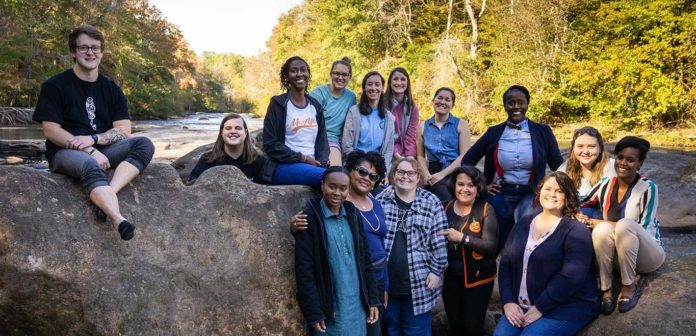
Mercer theology students have been renewing their connection with nature and tapping into their creative side through a unique new course offering.
“Creation Theology, Spirituality and the Arts” was designed by Dr. David Garber, associate professor of Old Testament and Hebrew, who has taught the course three times since 2015.
The course ties together Old Testament creation teachings, spiritual formation practices and the creative arts.
“I thought it would be a good opportunity to ground the intellectual work of our biblical studies with more spiritual learning,” he said. “In studying creation and the environment, one of the things I’ve noticed is that many of us don’t have a connection to the outdoors anymore. I wanted us to kind of find a way that we could take the classroom experience outside to those pockets of nature and have a lot of our meaningful discussion there.”
The course is held in a classroom on the Atlanta campus, but about every three weeks, students go to outdoor locations in metro Atlanta instead.
Dr. Garber has arranged class meetings at urban garden centers, such as Love Is Love Farm in Decatur, to talk about sustainability, organic growing and connecting with the community; Friendship Center of the Holy Comforter Episcopal Church, where they toured the property and discussed serving the homeless population; and Zoo Atlanta, which always leads to interesting discussion about ethics. The conversations can be difficult and heavy, but they are always respectful and informative.

“We talk about the interrelatedness of the study of these ancient texts that inform our faith, our connection with the environment and land, how that connects us to other people, and how students can use those insights in their ministries in the future,” he said.
The students prepare and present “centering activities” at the beginning of class to get everyone engaged, focused and ready to study the day’s topic.
In addition, they write an interpretative research paper on a creation topic; plan and go on a six- to eight-hour individual nature retreat where they reflect on that topic; and complete an artistic final project related to their experience.
Students have done activities like hiking, kayaking and camping for their retreats, and final projects have included music performances, interpretative dance, photo essays, sculptures, poetry, video essays and sermons.
“I wanted to embrace the different creative talents that our students have,” Dr. Garber said. “They take what they’ve learned in their retreat and find some sort of artistic expression to express the theme that rose to the top during those experiences.”
Jukabiea Barlow, an Army chaplain based in Atlanta and associate pastor at Cornerstone Baptist Church in Fayetteville, took Dr. Garber’s class in fall 2017. For his nature retreat, he made note of all the different nature sounds he heard as he walked around a lake in Peachtree City. He reflected on how the noises were given to these creatures by God so they could express themselves, he said.
“I did a musical interpretation of the creation story of Genesis,” said Barlow, who completed his theology degree at Mercer in May and also holds a bachelor’s degree in music. “I pretended that God was a composer and that the elements of creation were various instruments that were being written down on the composition.”
He created a main musical theme and layered tracks to represent each day that God created the world. He used a small keyboard, iPad Pro and editing software to assemble the song in real time during his 20-minute class presentation, explaining his thought process as he went.

“This course reminded me of how truly creative God is,” said Teruco Tynes, who graduated in May with a Master of Divinity degree with a concentration in pastoral care. “I watched my fellow students tap into their own creative outlets in this class, and I received additional insight into the multitude of ways to honor God.”
Tynes returned to her hometown of Nassau, The Bahamas, while she was taking Dr. Garber’s class in fall 2018 and spent time at a local beach for her nature retreat.
She chose to focus on the scripture in Exodus that tells of the Israelites safely crossing the Red Sea and the Egyptian army perishing in it. She took photos at the beach and reflected on water being a place of life and death. For her final project, she presented a collection of photos from her “humbling” day at the beach.
“During my presentation, I discussed God’s full and complete control over humankind and non-humankind,” Tynes said. “God is powerful, majestic, and God alone is capable of controlling nature and all of creation.”
It’s a journey for the students as they go through the course, and Dr. Garber said he is always taken aback by the way everything comes together so perfectly in their final projects. The students can apply their experiences in the course to the ministry settings they encounter in the future, such as Bible studies, retreats and community education projects.
“The lessons and outings of this class help me to remain deeply connected to God,” Tynes said. “I am able to express to others how deeply God cares for all of creation and how all of creation should care for each other.”
Barlow said the course gave him a new perspective on what it means to have a connection with the Earth. It reinforced in him a personal accountability to take care of not only the land and animals but himself. He and his wife have adopted a vegan diet and become very mindful of what they consume.








